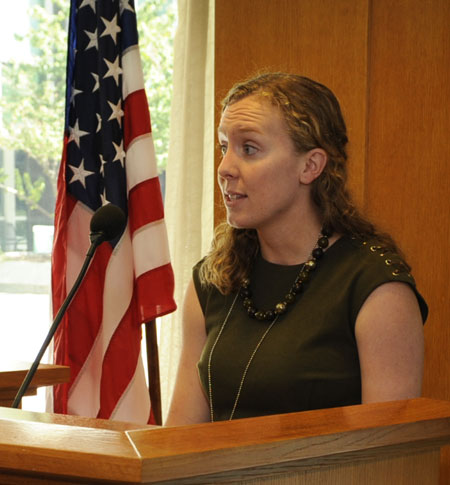State Department Recognizes Contributions of JMU Fellows
News
Emma Atkinson was handed a portfolio with some of the most relevant foreign policy topics "and allowed to jump right into them."
Kurt Chesko met contacts who hired him to open a new office of the HALO Trust, the world's largest humanitarian landmine clearance agency.
Katie Smith will never forget traveling to Mozambique and South Sudan to see demining work in action and Elise Becker had similar experiences in Senegal and Guinea-Bissau.
The four JMU alumni had those experiences while working as Frasure-Kruzel-Drew Memorial Fellows in Humanitarian Demining for the U.S. Department of State. The fellowship, a partnership between the Office of Weapons Removal and Abatement in the U.S. Department of State’s Bureau of Political-Military Affairs and the Center for International Stabilization and Recovery at JMU, was established in 1999 to honor three U.S. government officials who died in an August 1995 automobile accident in Bosnia and Herzegovina while on a mission to negotiate an end to the conflict there. In its early years, the fellowship lasted about a semester, but it has been a 12-month position for the past several years. Since its start, 20 JMU graduates interested in international relations have benefited from the unique experience to intern with the State Department.
"To date, these 20 outstanding young professionals have all made a valuable contribution to the State Department's work in the field of conventional weapons destruction, including humanitarian mine action, coordinating outreach activities, supporting travel and serving as assistant program managers," said Andrew Shapiro, assistant secretary of state for the Bureau of Political-Military Affairs, during an Aug. 29 reception for the fellows. "Each has taken full advantage of the opportunity to work for the federal government, broadening their horizons and gaining valuable work experience as they made their way from JMU to the working world."
Lindsay Aldrich, who received her master's degree in public administration from JMU this summer, is the 21st fellow, and the first graduate student selected for the position, which she started on Aug. 27.
"It seems like a great opportunity to work on an issue that I care about and to take part in what the U.S. is doing to restore safety and security for people in post-conflict areas around the world," said Aldrich, who previously worked for JMU Outreach and Engagement while doing her graduate work.
Atkinson, a 2009 JMU graduate, is now a program manager for conventional weapons destruction programs at the State Department and said the fellowship "provided an opportunity to be on the inside of what the U.S. government does in international relations and foreign policy."
During the fellowship, Atkinson said she had the opportunity to "get into the weeds on how humanitarian assistance programs are run and managed. I worked on hot foreign policy topics like South Sudan and Afghanistan and was even given the opportunity to travel to both countries. Talk about an eye-opening experience!"
Becker, a December 2005 graduate and now vice president for operations at The Marshall Legacy Institute, said one of the most beneficial parts of the fellowship was learning how to manage programs. "Toward the end of my fellowship I traveled to Senegal and Guinea-Bissau on a program assessment visit. I had a chance to meet the mine action operators and the U.S. embassy contacts who had the mine action portfolio and learn firsthand about the scope of contamination in both countries. I also helped put together several conferences in D.C. and Dubai hosted by the Office of Weapons Removal and Abatement."
Katie Smith, who is pursuing a master's degree at the University of Edinburgh, completed the fellowship in August and said traveling to Mozambique and South Sudan "was a powerful and very memorable experience and gave me a better understanding of the humanitarian demining process. My time with the State Department provided me a wonderful professional foundation."
Chesko also is in graduate school, pursuing a degree at New York University's Center for Global Affairs. He worked for more than 10 years at the HALO Trust, where in 2007 he became a vice president and oversaw fundraising and government relations.
“The FKD Fellowship is truly unique in the field and an amazing opportunity for a JMU graduate to play a role in weapons abatement globally and be of service to PM/WRA,” said Dr. Suzanne Fiederlein, CISR associate director and HD Fellowship Coordinator. “CISR is proud to oversee the application process and always excited to see the global impact JMU graduates have during the fellowship and after.”
Applications for the HD Fellowship are available on CISR’s website (https://cisr.jmu.edu). The deadline to apply is Nov. 30. The fellowship is open to graduating seniors or recent graduates of JMU. For more information, visit the CISR website, connect with CISR on Facebook (https://www.facebook.com/CISRJMU/) or e-mail CISR Project Manager Geary Cox (coxga@jmu.edu).

